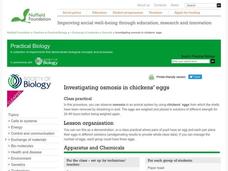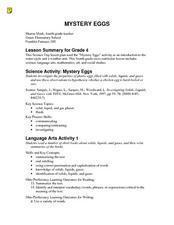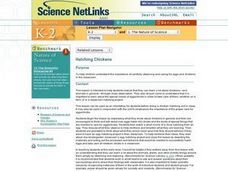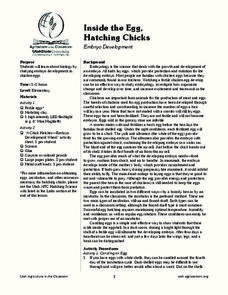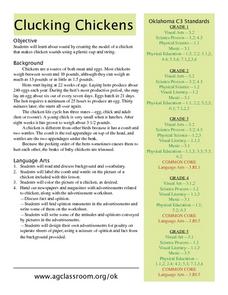Nuffield Foundation
Investigating Osmosis in Chickens' Eggs
You might not be able to learn through osmosis, but you sure can observe it! Scholars observe and measure osmosis using chicken eggs. They control for multiple variables to determine which variables have an impact and how the impact...
Curated OER
Hatching Chickens
Students consider the concept that much can be learned from the natural world by observation. They observe the incubation and hatching of chicken eggs in the classroom and discuss the needs of living things.
Curated OER
Eggs
Are you looking for a lesson on eggs for your young farmers? This one could be for you! Learners discover where eggs come from. They see the whole process of an egg coming from a hen, and ending up on their breakfast tables. They...
Curated OER
Hatching Chickens
Students understand the process of how an egg hatches. In this hatching eggs lesson, students care for eggs and chickens while the eggs are hatching. Students observe the hatching process and relate to other animals and humans.
Curated OER
Mystery Eggs
Students investigate the properties of plastic eggs filled with solids, liquids, and gases and use these observations to hypothesize whether a chicken egg is hard-boiled or raw.
Curated OER
About Chickens
Here's a cute and informative four-page packet of worksheets about chickens for your young agriculturists. They get to write words that have to do with chickens, perform cut-and-paste activities, and discover some fun facts about...
Curated OER
The Birds of a Feather Flock Together
Fifth graders identify all parts of an egg, and explore their importance to the life cycle of a chicken. Learners compare all sorts of birds and place them in categories based on what they look like. This five-day lesson plan effectively...
Curated OER
Egg Structure Project
Students investigate the physical structure of an egg and the functions of the seven parts. They create a diagram and discuss each part of the egg while looking for the information, Complete lesson materials are found at a website listed...
Curated OER
Hatching Chickens
Young scholars observe chickens hatching in a classroom incubation environment In this egg-hatching lesson plan, students make observations of the hatching process and later care for the hatched chickens.
Curated OER
Hatching Chickens
Students explain the importance of carefully observing and caring for eggs and chickens in the classroom.
Curated OER
Where Do Eggs Come From?
Students study the many characteristics that they share with other animals and how those characteristics relate to the proper care of animals. Students also study facts about chickens and chicken-related vocabulary. Finally, they study...
Curated OER
Hatching Egg Lesson
What a great way to introduce life cycles in your classroom! Kindergartners learn about chickens using visual aids, vocabulary lists, and more. If possible, you can have your class watch the process up close and personal by bringing in...
Curated OER
Poultry and Eggs
Egg-cellent! A series of lessons on eggs awaits your class. They study everything from how eggs are formed in a chicken's body to how well they float, how to determine if they are raw or cooked, the strength and construction of the...
LABScI
Cell Diffusion and Permeability: The See-Thru Egg Lab
Create a model to study a microscopic phenomenon. The seventh of 12 lessons uses an egg (without its shell) to represent a cell membrane. Using different solutions, learners explore the concept of cell diffusion. They monitor...
Curated OER
An Egg is Quiet
Students discover information about animal eggs by reading the book, An Egg is Quiet. In this animal science lesson, students research different animals to find out what their eggs look like. Students use a provided chart to guide...
Curated OER
Hatching Chickens
Students observe caring for eggs and chickens. In this hatching lesson students brainstorm what they know about chickens and carefully watch what happens.
Curated OER
Hatching Chickens
Students discover how chickens are hatched and cared for. For this hands on lesson students get to watch baby chicks be hatched. They explore the chicks needs and how long they take to hatch.
Curated OER
Hatching Chickens
Students observe how chickens hatch. In this life cycles lesson, students read the book Hatching Eggs: A Step by Step Guide and use an incubator to hatch the eggs. Students observe the chicks hatching and take care of the chicks by...
Curated OER
Hatching Chickens
Students observe and care for eggs and chickens. In this life cycles activity, students recall facts about chickens and how they hatch. Students read the article Hatching Eggs in the Classroom and observe the life cycle of the chicken in...
Curated OER
Inside the Egg, Hatching Chickens
Young scholars explore how an egg becomes fertilized. In this biology lesson, students "candle" a variety of eggs in order to determine which ones have been fertilized and which ones haven't. Student use paper plates to create a graphic...
Curated OER
What Is an Egg Without its Shell?
Students observe osmosis, a cellular process that normally can't be observed without a microscope, and use scientific method to observe osmosis in a chicken egg.
Curated OER
Clucking Chickens
A comb, wattle, and beak are three characteristics that describe a chicken. Your class can explore the life of a chicken through reading, art, movement, and music. Using a plastic cup and string, they'll create a pretend chicken that...
Curated OER
How Do You Like Your Eggs?
First graders conduct a poll about how people like their eggs. In this graphing instructional activity, 1st graders collect data about how they like their eggs. Students use a picture of themselves to place under the type of egg they...
Curated OER
Hatched From An Egg
Students discover how animals are born/hatched. In this life science instructional activity, students listen to a book entitled Chickens Aren't The Only Ones, and discuss animals that are hatched or born. Students receive a picture of...
Other popular searches
- Chicken Eggs in Vinegar
- Hatching Chicken Eggs
- Hatch Chicken Eggs
- Fertilized Chicken Eggs
- Incubation of Chicken Eggs
- Candling Chicken Eggs
- Chicken Eggs Calendar
- Chicken Eggs Hatched
- Counting Chicken Eggs
- Eggs/chicken


